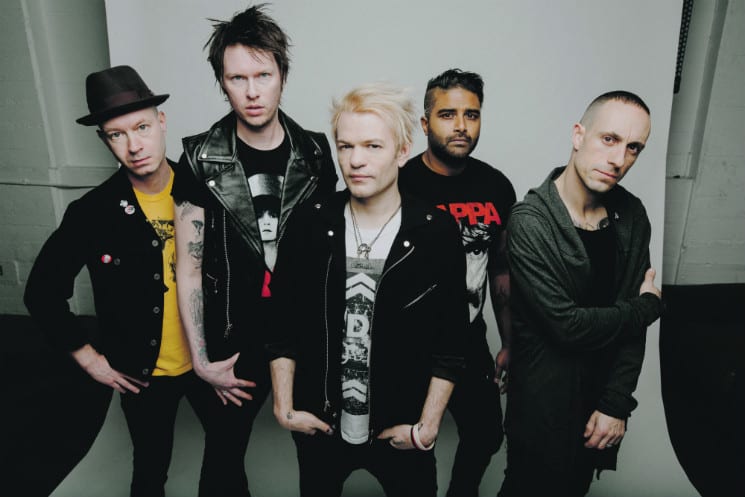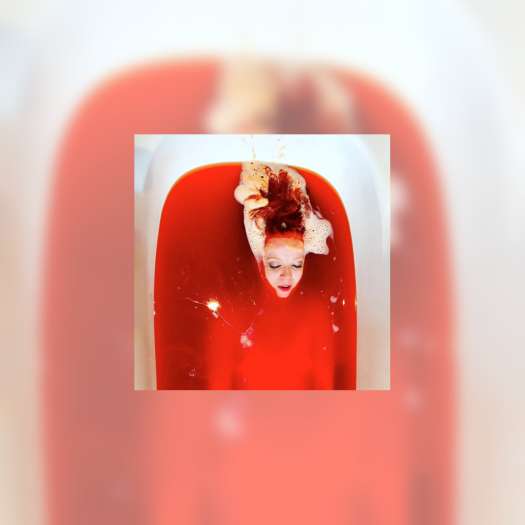Deryck Whibley doesn't have the greatest memories of music critics, and frankly, hearing the Sum 41 vocalist's stories about the press attention the band received at their start 20 years ago firsthand, I don't blame him.
"We definitely felt like, everywhere we went, every interview we did, we were just looked down upon as some dumb kids who are going to be a flash in the pan, gone within a record or two and never heard of again," he tells me now, over the phone. "Most people were pretty condescending and wrote shitty articles. If anybody would come out and hang out with us for a couple days on the road, we'd get some horrible fucking six-page spreads in whatever magazine it was."
He paints a picture of a band out of lockstep with the snide commentariat of the early 2000s. Sure, they had signed a massive record deal with Island Records when they were all teenagers, and opened for artists like Foo Fighters and Smashing Pumpkins before releasing their debut album, but they were earnest and goofy barely-20-somethings who grew up on hip-hop and heavy metal. They were met with scorn and derision by the Gen X and Baby Boomer professionals assigned to cover four people who would later come to be known as part of the first cohort of millennials.
"It felt like we were just some dumb kids to everybody, [like we] didn't know what we were talking about," Whibley recalls. "You just do what you do. Fuck everybody, who cares?"
Indeed, "Fuck everybody, who cares?" has been the band's ethos since they started making noise in the Greater Toronto Area town of Ajax, ON, in the late '90s as teenagers. From the metal riffs that open their storied debut EP Half Hour of Power (on a track called "Grab the Devil by the Horns and Fuck Him Up the Ass," of course), Sum 41 have stood out from their peers with their unique and unapologetic array of influences, lacing their du jour pop-punk with gratuitous shredding and hip-hop cadences. They spelled it out in what would become one of their biggest songs, "Fat Lip": "Maiden and Priest were the gods that we praised."
They were chastised for it at the time, says Whibley, but they didn't give a shit. "Everyone was confused," says Whibley about the reaction to the line at the time. He recalls people saying things such as, "'Why do you like Iron Maiden and Judas Priest? Those bands aren't cool.' And we're like, 'No, no, no, you're not cool! They are cool. If you don't know that, then you're not cool.' And now, Priest is getting inducted into the Hall of Fame, Maiden plays stadiums all around the world. They weren't at that time."
Much like how they were influenced by the cycles of nostalgia when they shouted out '80s metal in the early 2000s, they've now taken the place of the elder statesmen, routinely selling out venues all over the world and inspiring plenty of younger bands. All those who predicted the band were going to flame out quickly have had to eat those words millions of times over. They might be surprised, but Whibley isn't.
"It's just like high school," he says. "We knew everybody in high school were losers, but they were the popular people, but they were still the losers, and we were the cool ones. We knew we would prevail."
Those words would sound delusional in the mouths of most people, but Whibley and Sum 41 have the pedigree to back it up. Years after their initial globetrotting, tabloid-filling success at the vanguard of pop-punk, their 2019 album Order in Decline charted in 15 countries, and the scene they were key players in has received renewed attention as a new generation of musicians has picked up the mantle.
In other words, of course Sum 41 are cool. Who would say otherwise?
Sum 41 have been stoking the flames of nostalgia in recent years — on their most recent tour, they've been playing 2001 debut LP All Killer No Filler in its entirety, and their upcoming Europe tour will be adding 2002 follow-up Does This Look Infected? to the mix — but it's been a little surprising to see them embrace the past. Only last year, Whibley shared some negative feelings about All Killer in an interview with Billboard for its 20th anniversary, saying, "I've always felt it wasn't that great, if I'm being honest. I never quite understood — to a point where it's almost like, when people tell me it means a lot to them or it was a really good album compared to other records, I always think they're lying. I've always felt like, 'Have you listened to it lately, though? I don't know if it holds up.'"
Now, after one leg of the tour, Whibley's thoughts are a little more nuanced. "I feel like some of the songs were probably better than I remembered them. I think I had [an opinion] about that record that I just didn't really care for it, but it actually held up a little bit better than I thought. When you're young, there's, like, this youth energy that you have. When I listen to that record [now], I hear how poorly some of it was played, how bad of musicians we actually were back then because we were so new, but somehow, the looseness adds this energy to it, it kind of adds an excitement. Records are always Polaroids of who you are at that moment. And I think that record captured who we were exactly. Lyrically, especially, you know, it's like a song like 'Fat Lip,' that just sort of encapsulates, completely, who we were back then."
And who were they back then? Well, they were kids.
"We were young, but we were younger in maturity. We were like 19 going on 14 or 15. Every minute had to be fun, every minute we had to be laughing or doing something exciting. We were almost like toddlers in [that] everything has to be high-excitement all the time," reflects Whibley. "When we signed [Island Records'] deal, and they gave us all the money to go make a record and just a tour and to do whatever we wanted, we were these kids with the unlimited bank account all of a sudden to just go have fun. That was basically our mentality at the time: all fun all the time. And the four of us were just best friends. And we're just sort of living and watching this dream come true."
You can still hear it in the records, and especially in footage of their live shows. Whether playing the classics or newer material, fans appear to be in complete, ecstatic uproar, something to be expected when Sum 41 play in Canada later this week — in Ottawa (July 13), Toronto (July 14), Quebec City (July 15) and Alma, QC (July 17).
But unlike their pop-punk peers who have faced criticism that they need to grow up, Sum 41 have grown up. They may still appeal to teenagers (says Whibley, "as far as I can see, which is the front row on to a little bit into the crowd, [the crowd looks] the same age it always did") but they're hardly 40-something men griping about girls and whining about hurt feelings. Their present-day perspectives are informed by what's happened to them in recent years, including Whibley's hospitalization in 2014 from alcoholism and lead guitarist Dave Baksh's bout with cancer earlier this year (it's currently in complete remission).
Whibley's been open about his sobriety, and is first to say that it's been crucial in keeping up the band's reputation as a great live band. When they were trying to get signed in the '90s, they littered the stage with trampolines to ramp up the chaos, but those are long gone now. "I definitely have back issues and feet issues, ankle problems and I'm sure it's all coming from that," he says, and the reverberations from those antics had serious consequences.
"I got sober when I was 34," reflects Whibley now, eight years later. "Leading up to that, all I ever did was just drink away any pain or any injury. You just self-medicate, and it works, but then it gets to a point where it doesn't work. And that's what ended up happening with me, and I ended up going to the hospital." Now, he says, "I have so much more energy, and I'm in so much better shape than I ever was, so it's easier, and I move more and better." (But it doesn't mean he's not in pain anymore; he tells me, "If you will go see an Iggy Pop show, he's crazy onstage, but I'll talk to him backstage and we'll compare what injuries we've got going right now. You're always in pain!")
Perhaps that's why he's able to revisit his pop-punk past with clear eyes. Sum 41's recent US tour and upcoming tours of the US and Europe are team-ups with Simple Plan, their one-time rivals for Canada's pop-punk crown. Sum 41's upcoming release, currently planned to be a double album titled Heaven and Hell, finds them revisiting their earliest influences for one disc of pop-punk and, for the first time ever, one disc dedicated toward their longtime love of thrash metal. During our chat, Whibley cites influences like Priest, Metallica and Slayer, neither of us aware that in only a few weeks' time, dependable '80s nostalgia machine Stranger Things would introduce a new generation to the iconic "Master of Puppets" in yet another instance of Whibley being ahead of the curve.
It just speaks to the band's career-long dedication to being true to themselves above anything else — as long as they think they're cool, then they are cool. And, again, people agree, like Toronto punks the OBGMs, who are in the first opening slot for Sum 41 at Budweiser Stage later this week. Says OBGMs vocalist Denz McFarlane in an email, "Sum 41 are some legends and have been since I was taking painful Ls in Guitar Hero trying to get 'Fat Lip' right. They had the country on their back for a long time. It's great to be a part of this piece of Canadian history, and it should be officially declared a heritage moment."
Whibley comes off as too humble to ever compare his own concert to, say, discovering insulin or inventing basketball, but that Budweiser Stage show is a pretty monumental event, bringing together three generations of Canadian punk bands in Sum 41, the OBGMs and '90s pop-punk progenitors Gob (American rockers All Time Low are also on the bill).
Plus, Whibley's got his own reasons for wanting to give it his all: "Toronto's always been, obviously, where we come from, so it's special. If we weren't even Canadian, Toronto is one of the best cities to play in, for any band. Most bands will talk about that, too. It's one of the best audiences."
As Sum 41 prepare for several months of tour dates and finishing Heaven and Hell — Whibley estimates they're about "85 percent of the way there," a figure complicated by two new songs he recently wrote and is looking to add to the already super-sized affair — they still bear a shocking resemblance, despite everything they've been through, to the same scrappy, eager-to-thrill underdogs the world was introduced to over two decades ago. Whibley's still excited, still willing to put his body on the line, still filled with an exuberance and honesty that can be heard in his newest lyrics.
People may have disagreed with them then, but it's undeniable now: Sum 41 have always been cool and have never cared if you believed them — and that just makes them even cooler.
"We definitely felt like, everywhere we went, every interview we did, we were just looked down upon as some dumb kids who are going to be a flash in the pan, gone within a record or two and never heard of again," he tells me now, over the phone. "Most people were pretty condescending and wrote shitty articles. If anybody would come out and hang out with us for a couple days on the road, we'd get some horrible fucking six-page spreads in whatever magazine it was."
He paints a picture of a band out of lockstep with the snide commentariat of the early 2000s. Sure, they had signed a massive record deal with Island Records when they were all teenagers, and opened for artists like Foo Fighters and Smashing Pumpkins before releasing their debut album, but they were earnest and goofy barely-20-somethings who grew up on hip-hop and heavy metal. They were met with scorn and derision by the Gen X and Baby Boomer professionals assigned to cover four people who would later come to be known as part of the first cohort of millennials.
"It felt like we were just some dumb kids to everybody, [like we] didn't know what we were talking about," Whibley recalls. "You just do what you do. Fuck everybody, who cares?"
Indeed, "Fuck everybody, who cares?" has been the band's ethos since they started making noise in the Greater Toronto Area town of Ajax, ON, in the late '90s as teenagers. From the metal riffs that open their storied debut EP Half Hour of Power (on a track called "Grab the Devil by the Horns and Fuck Him Up the Ass," of course), Sum 41 have stood out from their peers with their unique and unapologetic array of influences, lacing their du jour pop-punk with gratuitous shredding and hip-hop cadences. They spelled it out in what would become one of their biggest songs, "Fat Lip": "Maiden and Priest were the gods that we praised."
They were chastised for it at the time, says Whibley, but they didn't give a shit. "Everyone was confused," says Whibley about the reaction to the line at the time. He recalls people saying things such as, "'Why do you like Iron Maiden and Judas Priest? Those bands aren't cool.' And we're like, 'No, no, no, you're not cool! They are cool. If you don't know that, then you're not cool.' And now, Priest is getting inducted into the Hall of Fame, Maiden plays stadiums all around the world. They weren't at that time."
Much like how they were influenced by the cycles of nostalgia when they shouted out '80s metal in the early 2000s, they've now taken the place of the elder statesmen, routinely selling out venues all over the world and inspiring plenty of younger bands. All those who predicted the band were going to flame out quickly have had to eat those words millions of times over. They might be surprised, but Whibley isn't.
"It's just like high school," he says. "We knew everybody in high school were losers, but they were the popular people, but they were still the losers, and we were the cool ones. We knew we would prevail."
Those words would sound delusional in the mouths of most people, but Whibley and Sum 41 have the pedigree to back it up. Years after their initial globetrotting, tabloid-filling success at the vanguard of pop-punk, their 2019 album Order in Decline charted in 15 countries, and the scene they were key players in has received renewed attention as a new generation of musicians has picked up the mantle.
In other words, of course Sum 41 are cool. Who would say otherwise?
Sum 41 have been stoking the flames of nostalgia in recent years — on their most recent tour, they've been playing 2001 debut LP All Killer No Filler in its entirety, and their upcoming Europe tour will be adding 2002 follow-up Does This Look Infected? to the mix — but it's been a little surprising to see them embrace the past. Only last year, Whibley shared some negative feelings about All Killer in an interview with Billboard for its 20th anniversary, saying, "I've always felt it wasn't that great, if I'm being honest. I never quite understood — to a point where it's almost like, when people tell me it means a lot to them or it was a really good album compared to other records, I always think they're lying. I've always felt like, 'Have you listened to it lately, though? I don't know if it holds up.'"
Now, after one leg of the tour, Whibley's thoughts are a little more nuanced. "I feel like some of the songs were probably better than I remembered them. I think I had [an opinion] about that record that I just didn't really care for it, but it actually held up a little bit better than I thought. When you're young, there's, like, this youth energy that you have. When I listen to that record [now], I hear how poorly some of it was played, how bad of musicians we actually were back then because we were so new, but somehow, the looseness adds this energy to it, it kind of adds an excitement. Records are always Polaroids of who you are at that moment. And I think that record captured who we were exactly. Lyrically, especially, you know, it's like a song like 'Fat Lip,' that just sort of encapsulates, completely, who we were back then."
And who were they back then? Well, they were kids.
"We were young, but we were younger in maturity. We were like 19 going on 14 or 15. Every minute had to be fun, every minute we had to be laughing or doing something exciting. We were almost like toddlers in [that] everything has to be high-excitement all the time," reflects Whibley. "When we signed [Island Records'] deal, and they gave us all the money to go make a record and just a tour and to do whatever we wanted, we were these kids with the unlimited bank account all of a sudden to just go have fun. That was basically our mentality at the time: all fun all the time. And the four of us were just best friends. And we're just sort of living and watching this dream come true."
You can still hear it in the records, and especially in footage of their live shows. Whether playing the classics or newer material, fans appear to be in complete, ecstatic uproar, something to be expected when Sum 41 play in Canada later this week — in Ottawa (July 13), Toronto (July 14), Quebec City (July 15) and Alma, QC (July 17).
But unlike their pop-punk peers who have faced criticism that they need to grow up, Sum 41 have grown up. They may still appeal to teenagers (says Whibley, "as far as I can see, which is the front row on to a little bit into the crowd, [the crowd looks] the same age it always did") but they're hardly 40-something men griping about girls and whining about hurt feelings. Their present-day perspectives are informed by what's happened to them in recent years, including Whibley's hospitalization in 2014 from alcoholism and lead guitarist Dave Baksh's bout with cancer earlier this year (it's currently in complete remission).
Whibley's been open about his sobriety, and is first to say that it's been crucial in keeping up the band's reputation as a great live band. When they were trying to get signed in the '90s, they littered the stage with trampolines to ramp up the chaos, but those are long gone now. "I definitely have back issues and feet issues, ankle problems and I'm sure it's all coming from that," he says, and the reverberations from those antics had serious consequences.
"I got sober when I was 34," reflects Whibley now, eight years later. "Leading up to that, all I ever did was just drink away any pain or any injury. You just self-medicate, and it works, but then it gets to a point where it doesn't work. And that's what ended up happening with me, and I ended up going to the hospital." Now, he says, "I have so much more energy, and I'm in so much better shape than I ever was, so it's easier, and I move more and better." (But it doesn't mean he's not in pain anymore; he tells me, "If you will go see an Iggy Pop show, he's crazy onstage, but I'll talk to him backstage and we'll compare what injuries we've got going right now. You're always in pain!")
Perhaps that's why he's able to revisit his pop-punk past with clear eyes. Sum 41's recent US tour and upcoming tours of the US and Europe are team-ups with Simple Plan, their one-time rivals for Canada's pop-punk crown. Sum 41's upcoming release, currently planned to be a double album titled Heaven and Hell, finds them revisiting their earliest influences for one disc of pop-punk and, for the first time ever, one disc dedicated toward their longtime love of thrash metal. During our chat, Whibley cites influences like Priest, Metallica and Slayer, neither of us aware that in only a few weeks' time, dependable '80s nostalgia machine Stranger Things would introduce a new generation to the iconic "Master of Puppets" in yet another instance of Whibley being ahead of the curve.
It just speaks to the band's career-long dedication to being true to themselves above anything else — as long as they think they're cool, then they are cool. And, again, people agree, like Toronto punks the OBGMs, who are in the first opening slot for Sum 41 at Budweiser Stage later this week. Says OBGMs vocalist Denz McFarlane in an email, "Sum 41 are some legends and have been since I was taking painful Ls in Guitar Hero trying to get 'Fat Lip' right. They had the country on their back for a long time. It's great to be a part of this piece of Canadian history, and it should be officially declared a heritage moment."
Whibley comes off as too humble to ever compare his own concert to, say, discovering insulin or inventing basketball, but that Budweiser Stage show is a pretty monumental event, bringing together three generations of Canadian punk bands in Sum 41, the OBGMs and '90s pop-punk progenitors Gob (American rockers All Time Low are also on the bill).
Plus, Whibley's got his own reasons for wanting to give it his all: "Toronto's always been, obviously, where we come from, so it's special. If we weren't even Canadian, Toronto is one of the best cities to play in, for any band. Most bands will talk about that, too. It's one of the best audiences."
As Sum 41 prepare for several months of tour dates and finishing Heaven and Hell — Whibley estimates they're about "85 percent of the way there," a figure complicated by two new songs he recently wrote and is looking to add to the already super-sized affair — they still bear a shocking resemblance, despite everything they've been through, to the same scrappy, eager-to-thrill underdogs the world was introduced to over two decades ago. Whibley's still excited, still willing to put his body on the line, still filled with an exuberance and honesty that can be heard in his newest lyrics.
People may have disagreed with them then, but it's undeniable now: Sum 41 have always been cool and have never cared if you believed them — and that just makes them even cooler.




